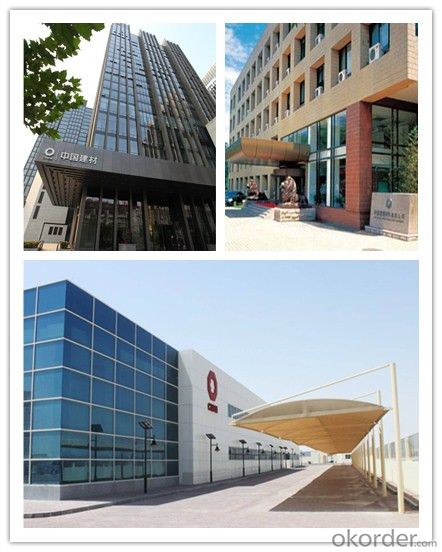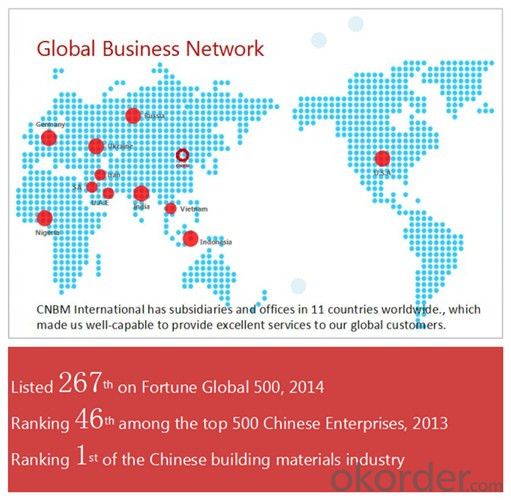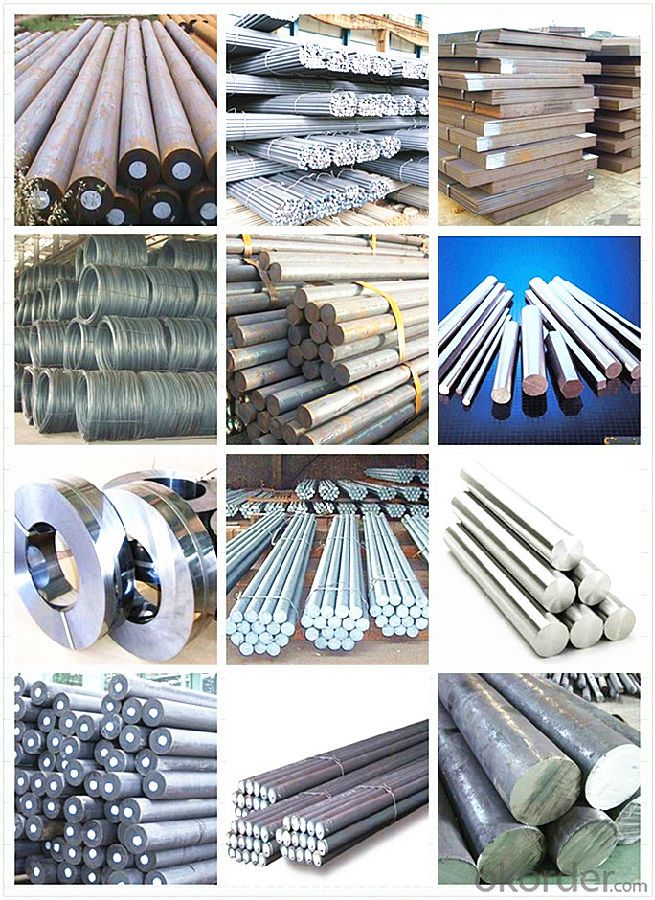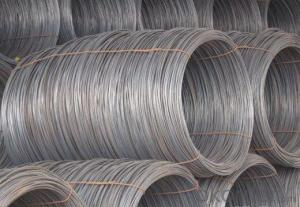Grade SAE 1010 Hot Rolled Steel Wire Rod in Coils
- Loading Port:
- Tianjin
- Payment Terms:
- TT OR LC
- Min Order Qty:
- 3 m.t.
- Supply Capability:
- 10000 m.t./month
OKorder Service Pledge
Quality Product, Order Online Tracking, Timely Delivery
OKorder Financial Service
Credit Rating, Credit Services, Credit Purchasing
You Might Also Like
Item specifice
Type:
Carbon Steel,Spring Steel,Bearing Steel,Gear Steel,Deformed Steel,Stainless Steel,Alloy Steel
Shape:
Steel Coil,Steel Sheet,Steel Wire Rod,Steel Flat Bar,Steel Square Bar,Steel Angle,Steel Round Bar,Steel Billets
Technique:
Hot Rolled,Cold Rolled,Cold Drawn,ERW,Forged,Saw,Extruded,EFW,Spring
Surface Treatment:
Galvanized,Coated,Copper Coated,Color Coated,Oiled,Dry,Chromed Passivation,Polished,Bright,Black,PVDF Coated
Certification:
ISO,SGS,BV,IBR,RoHS,CE,API,BSI,UL
Thickness:
5.5mm, 6.5mm, 8-14mm
Width:
5.5mm, 6.5mm, 8-14mm
Length:
In coils
Outer Diameter:
5.5mm, 6.5mm, 8-14mm
Net Weight:
2m.t.
Packaging:
Seaworthy packaging
Grade SAE 1010 Hot Rolled Steel Wire Rod in Coils
Detailed Information of the Grade SAE 1010 Hot Rolled Steel Wire Rod in Coils
| Name | Hot Rolled High Carbon Wire Rod |
| Shape | Round Bar/Square Bar/Flat Bar/Plate/Wire |
| Standard | GB/ASTM/SAE/AISI/DIN/JIS/EN/BS |
| Surface Treatment: | Black/Peeling/Polished/Machined |
| Delivery Condition: | Hot Rolled or Forged/Peeled or Black Surface |
| Test | SGS/UT 100% Elements Testing |
| Certificate: | ISO/Mill Certificate |
| Service: | 24 hours online service / |
| more than 20 years trading and manufacture | |
| Quality Assurance: | the third party inspection, such as SGS, BV, TUV…etc. is acceptable |
| Packaging Details: | Seaworthy Packaging or as per customer's packing instruction |
Chemical Composition of the Grade SAE 1010 Hot Rolled Steel Wire Rod in Coils
| Grade | Chemical Composition(%) | |||||
| C | Mn | Si | S | P | B | |
| SAE1010 | 0.1max. | 0.3~0.50 | 0.15max | 0.050max | ≤0.040 | >0.0008 |
| Mechanical properties | ||||||
| Yield strength(N/mm2) | Tensile strength(N/mm2) | Elongation(%) | ||||
| 250-280 | 350-380 | ≥32 | ||||
Company Introduction the Grade SAE 1010 Hot Rolled Steel Wire Rod in Coils
CNBM International Corporation is the most import and export platform of CNBM group(China National Building Material Group Corporation) ,which is a state-owned enterprise, ranked in 270th of Fortune Global 500 in 2015.
With its advantages, CNBM International are mainly concentrate on Cement, Glass, Iron and Steel, Ceramics industries and devotes herself for supplying high quality series of refractories as well as technical consultancies and logistics solution.


| After-sale service | CNBM provides the services and support you need for every step of our cooperation. We’re the business partners you can trust; you can relax and get on with doing business. |
| For any problem, please kindly contact us at any your convenient time, we’ll reply you in our first priority within 24 hours | |
| Advantages | Industry experience over 20 years. |
| Shipment of goods -More than 70 countries worldwide. | |
| The most convenient transport and prompt delivery. | |
| Competitive price with best service. | |
| High technical production line with top quality products. | |
| High reputation based on best quality products. |
Packaging & Delivery the Grade SAE 1010 Hot Rolled Steel Wire Rod in Coils
| Packaging Detail | Sea worthy packing /as per customer's packing instruction |
| Delivery Detail | 15 ~ 40 days after receiving the deposit |
Products Show

FAQ:
| Are you a trader or manufacturer? | Manufacturer |
| What’s the MOQ? | 3 metric ton |
| What’s your delivery time? | 15-35 days after downpayment received |
| Do you Accept OEM service? | Yes |
| what’s your delivery terms? | FOB/CFR/CIF |
| What's the Payment Terms? | 30% as deposit,70% before shipment by T/T |
| Western Union acceptable for small amount. | |
| L/C acceptable for large amount. | |
| Scrow ,Paybal,Alipay are also ok | |
| Why choose us? | Chose happens because of quality, then price, We can give you both. |
| Additionally, we can also offer professional products inquiry, products knowledge train (for agents), smooth goods delivery, excellent customer solution proposals. | |
| What's your available port of Shipment? | Main Port, China |
| What’s your featured services? | Our service formula: good quality+ good price+ good service=customer's trust |
| Where are your Market? | Covering more than 160 countries in the world |
- Q:Can special steel be used in the pharmaceutical industry?
- Yes, special steel can be used in the pharmaceutical industry for various applications. Special steel alloys such as stainless steel are often used to manufacture equipment and components required for pharmaceutical manufacturing processes. These steel alloys offer excellent corrosion resistance, high strength, and hygienic properties, making them suitable for pharmaceutical applications where cleanliness, durability, and sterility are crucial. Additionally, special steel can be used to construct storage tanks, piping systems, and vessels that are resistant to chemical reactions and contamination, maintaining the integrity and purity of pharmaceutical products.
- Q:How does special steel contribute to the transportation equipment industry?
- Special steel plays a crucial role in the transportation equipment industry by providing high strength, durability, and resistance to wear and corrosion. It allows for the construction of lighter yet stronger components, leading to improved fuel efficiency, increased payload capacity, and enhanced safety in vehicles. Additionally, special steel enables the production of precision parts and components, ensuring the reliability and performance of transportation equipment.
- Q:How does special steel perform in abrasive environments?
- Special steel performs exceptionally well in abrasive environments. Its high hardness and resistance to wear make it ideal for applications where there is constant contact with abrasive materials. Special steel can withstand the impact and friction caused by abrasive particles, ensuring longevity and durability in such environments. Additionally, its corrosion resistance properties prevent the steel from deteriorating due to exposure to moisture or chemicals commonly found in abrasive environments. Overall, special steel is specifically designed to excel in abrasive conditions, providing optimal performance and reliability.
- Q:What are the thermal properties of special steel?
- Special steel, also known as tool steel or alloy steel, possesses excellent thermal properties. It has a high melting point, allowing it to withstand extreme temperatures without losing its structural integrity. Furthermore, special steel exhibits good heat resistance, ensuring it retains its strength and hardness even when exposed to high thermal loads. Additionally, its thermal conductivity is relatively low, making it suitable for applications where heat transfer needs to be controlled or minimized. Overall, the thermal properties of special steel make it a reliable material for various industrial and engineering applications that involve high temperatures and thermal stresses.
- Q:What are the different methods of surface honing for special steel?
- There are several different methods of surface honing for special steel, each with its own advantages and applications. Some of the most commonly used methods include: 1. Manual Honing: This method involves using hand-held honing tools such as stones, sticks, or abrasive pads to manually remove material from the surface of the special steel. Manual honing allows for precise control and is often used for smaller or intricate parts. 2. Machine Honing: Machine honing utilizes specialized honing machines that automate the honing process. These machines typically consist of rotating honing stones or abrasive belts that remove material from the surface of the steel. Machine honing is often preferred for larger or more complex parts, as it can achieve consistent and high-quality results. 3. Diamond Honing: Diamond honing is a method that uses diamond abrasives to remove material from the surface of the special steel. Diamond is one of the hardest substances known, making it highly effective for honing steel. This method is often used for high-precision applications or when a very smooth surface finish is required. 4. Superfinishing: Superfinishing is a specialized honing process that is used to achieve extremely fine surface finishes on special steel. It involves using a combination of honing stones and abrasive pastes to remove microscopically small amounts of material from the surface. Superfinishing is typically used for critical applications where surface roughness and dimensional accuracy are of utmost importance. 5. Lapping: Lapping is a honing method that uses a combination of abrasive particles and a rotating or vibrating tool to remove material from the surface of the steel. It is often used for parts that require a very flat or parallel surface, such as bearings or sealing surfaces. 6. Electrochemical Honing: Electrochemical honing is a specialized honing process that uses an electric current to remove material from the surface of the special steel. It is often used for complex or hard-to-reach surfaces, as it can effectively remove material from areas that are difficult to access with other honing methods. In summary, the different methods of surface honing for special steel include manual honing, machine honing, diamond honing, superfinishing, lapping, and electrochemical honing. Each method has its own unique advantages and applications, allowing for precise control and achieving the desired surface finish and dimensional accuracy for special steel components.
- Q:What are the different methods of surface lapping for special steel?
- Special steel can be lapped using several different methods to attain a high degree of flatness and smoothness on its surface. One commonly employed technique is known as free abrasive lapping. This method entails the utilization of a slurry containing abrasive particles to polish the steel surface. Typically, the slurry is applied to a rotating lap plate, which is then pressed against the steel surface. Through the abrasive particles' action, material is removed from the surface, resulting in a smoother and flatter finish. Another method, fixed abrasive lapping, involves the use of a rigid lap plate embedded with abrasive particles to polish the steel surface. Generally, the lap plate is composed of a harder material than the steel being lapped. As the lap plate rotates and is pressed against the steel surface, the embedded abrasive particles remove material, thus achieving a smoother finish. Chemical lapping is an additional technique applicable to special steel. In this method, a chemical solution is applied to the steel surface. The chemical solution reacts with the surface, dissolving and eliminating a thin layer of material. Chemical lapping is typically chosen when a high level of flatness is required. Ultrasonic lapping takes advantage of ultrasonic vibrations to enhance the lapping process. In this method, the steel surface is immersed in a mixture of abrasive particles and liquid medium. Ultrasonic vibrations are then applied to the liquid medium, causing the abrasive particles to vibrate and remove material from the steel surface. This technique is particularly effective for lapping hard and brittle materials. In summary, the various methods of surface lapping offer different approaches to achieve the desired level of flatness and smoothness for special steel. The choice of method depends on factors like the type of steel, the desired surface finish, and the specific requirements of the application.
- Q:How does tool steel maintain its hardness at high temperatures?
- Tool steel maintains its hardness at high temperatures due to its high carbon content and alloying elements. The high carbon content allows for the formation of carbides, which are extremely hard and stable even at elevated temperatures. Additionally, the alloying elements in tool steel, such as chromium, tungsten, and molybdenum, form secondary carbides that further enhance the steel's hardness and heat resistance. These carbides act as strengthening agents, preventing the steel from losing its hardness and maintaining its performance even under high-temperature conditions.
- Q:What are the different methods for improving the creep resistance of special steel?
- There are several methods for improving the creep resistance of special steel. One approach is through alloying, where elements such as chromium, molybdenum, and tungsten are added to enhance the strength and stability of the steel at high temperatures. Another method is by heat treatment, which involves controlled heating and cooling processes to optimize the microstructure of the steel and improve its creep resistance. Additionally, surface treatments like carburizing or nitriding can be applied to increase the hardness and wear resistance of the steel, thereby improving its creep resistance. Lastly, proper design and engineering considerations, such as using thicker sections or incorporating reinforcements, can also contribute to enhancing the creep resistance of special steel.
- Q:What are the properties and characteristics of special steel?
- Special steel encompasses a type of steel that possesses distinct attributes and qualities, rendering it suitable for particular applications that demand exceptional strength, endurance, and resilience against diverse environmental factors. The properties and characteristics of special steel encompass the following: 1. Remarkable Strength: Special steel is renowned for its extraordinary strength, enabling it to endure heavy loads and extreme circumstances. This renders it ideal for applications requiring structural integrity and durability, such as the construction, automotive, and aerospace sectors. 2. Superb Resistance to Corrosion: Special steel is frequently alloyed with elements such as chromium and nickel, augmenting its resistance to corrosion and oxidation. This characteristic makes it immensely valuable in environments where exposure to moisture, chemicals, or extreme temperatures can rapidly deteriorate conventional steel. 3. Resistance to High Temperatures: Special steel is designed to maintain its mechanical properties and structural integrity even when subjected to elevated temperatures. It demonstrates exceptional thermal stability, making it suitable for applications involving intense heat, such as power generation, the oil and gas industry, and manufacturing processes. 4. Resistance to Wear: Special steel is frequently hardened and treated to enhance its resistance to wear. This trait enables it to withstand abrasive materials, friction, and erosion, making it suitable for cutting tools, machine parts, and wear-resistant components in heavy machinery. 5. Magnetic Characteristics: Certain types of special steel exhibit magnetic properties, rendering them ideal for applications in the electrical and electronics industries. Examples include electrical transformers, motors, generators, and magnetic shielding. 6. Machinability: Special steel is designed to be easily machined, enabling it to be shaped, formed, and fabricated into various components with precision. This attribute is crucial for industries requiring the production of intricate and complex parts in an efficient manner. 7. Cost-effectiveness: Despite possessing unique properties, special steel often proves to be cost-effective compared to other materials with similar performance characteristics. Its long lifespan, resistance to corrosion and wear, and versatility make it the preferred choice for numerous applications, offering a balance between performance and cost. In summary, special steel combines exceptional strength, resistance to corrosion and wear, heat resistance, and magnetic properties, making it a versatile material utilized in diverse industries. Its distinctive properties render it an indispensable component in applications where standard steel or alternative materials would not suffice.
- Q:What are the requirements for special steel used in transportation equipment manufacturing?
- The requirements for special steel used in transportation equipment manufacturing are diverse and specific to the particular application in question. However, there are some common requirements that generally apply across the board. First and foremost, the special steel used in transportation equipment manufacturing needs to have high strength and durability. It must be able to withstand the rigorous demands of transportation, including heavy loads, vibrations, and impacts. Special steel with a high tensile strength and toughness is essential to ensure the structural integrity and safety of the transportation equipment. Secondly, the special steel must possess excellent corrosion resistance. Transportation equipment is exposed to various environmental conditions, including moisture, salt, chemicals, and extreme temperatures. Corrosion can lead to the deterioration and weakening of the steel, compromising the performance and longevity of the equipment. Therefore, using corrosion-resistant special steel is crucial to ensure the durability and reliability of transportation equipment. Additionally, the special steel used in transportation equipment manufacturing should have good weldability and formability. It must be able to be easily shaped, fabricated, and joined together through welding or other methods. This allows for the efficient production of complex structures and components, enabling the manufacturing of transportation equipment with intricate designs and specifications. Moreover, the special steel should also possess good fatigue resistance. Fatigue failure can occur due to repeated loading and unloading cycles, which is a common occurrence in transportation equipment. The special steel should be able to withstand this cyclic loading without undergoing fatigue cracks or failure, ensuring the long-term reliability of the equipment. Lastly, special steel used in transportation equipment manufacturing must comply with industry standards and regulations. Depending on the specific application and region, there may be certain legal requirements and safety standards that need to be met. These could include certifications, such as ISO, ASTM, or other relevant standards, to ensure the quality and performance of the steel. In summary, the requirements for special steel used in transportation equipment manufacturing include high strength, durability, corrosion resistance, good weldability and formability, fatigue resistance, and compliance with industry standards. Meeting these requirements is crucial to ensure the safety, reliability, and longevity of transportation equipment.
1. Manufacturer Overview |
|
|---|---|
| Location | |
| Year Established | |
| Annual Output Value | |
| Main Markets | |
| Company Certifications | |
2. Manufacturer Certificates |
|
|---|---|
| a) Certification Name | |
| Range | |
| Reference | |
| Validity Period | |
3. Manufacturer Capability |
|
|---|---|
| a)Trade Capacity | |
| Nearest Port | |
| Export Percentage | |
| No.of Employees in Trade Department | |
| Language Spoken: | |
| b)Factory Information | |
| Factory Size: | |
| No. of Production Lines | |
| Contract Manufacturing | |
| Product Price Range | |
Send your message to us
Grade SAE 1010 Hot Rolled Steel Wire Rod in Coils
- Loading Port:
- Tianjin
- Payment Terms:
- TT OR LC
- Min Order Qty:
- 3 m.t.
- Supply Capability:
- 10000 m.t./month
OKorder Service Pledge
Quality Product, Order Online Tracking, Timely Delivery
OKorder Financial Service
Credit Rating, Credit Services, Credit Purchasing
Similar products
New products
Hot products
Related keywords
































